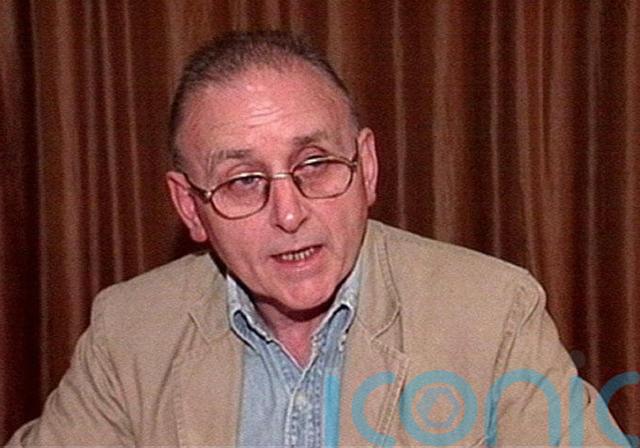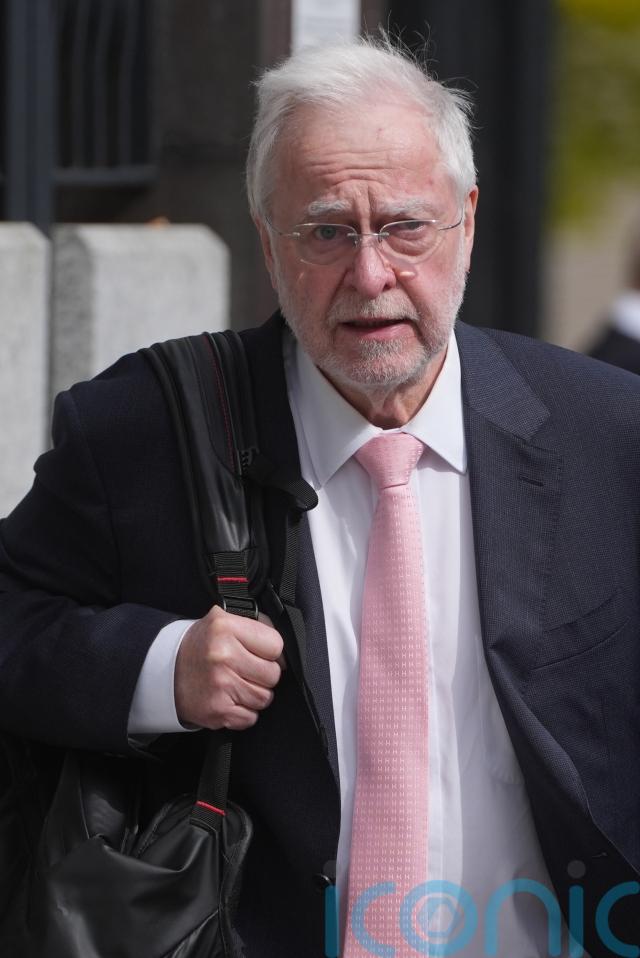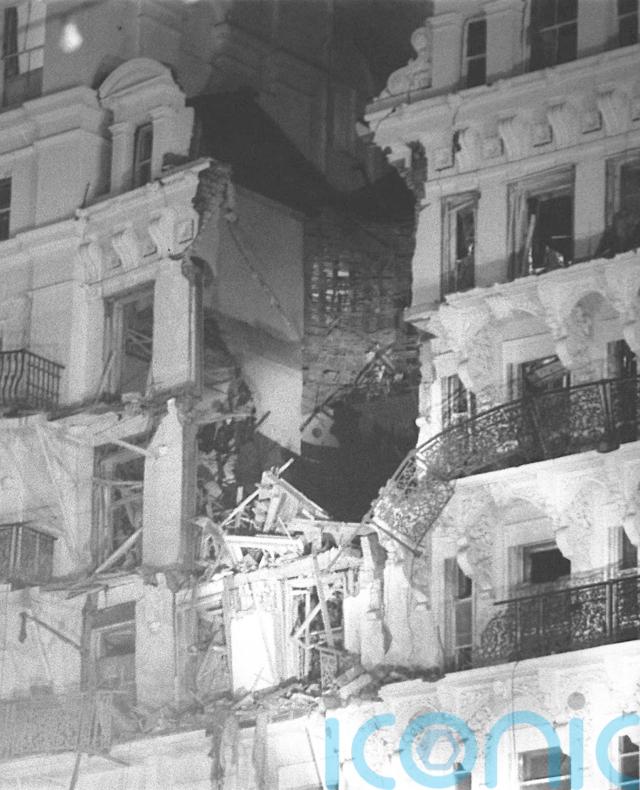
Gerry Adams is engaging in “a cynical attempt to launder his reputation” by suing the BBC, a jury has been told.
Mr Adams is suing the BBC over what he claims was a “grievous smear” against him.
He says a BBC Spotlight programme, and an accompanying online story, defamed him by alleging he sanctioned the killing of former Sinn Fein official Denis Donaldson, in which he denies any involvement.
Mr Donaldson was shot dead in 2006, months after admitting his role as a police and MI5 agent for 20 years.

In 2009, the Real IRA claimed the killing, and the Spotlight programme was broadcast in September 2016 while a Garda investigation was ongoing.
In the programme, an anonymous source given the pseudonym Martin claimed the shooting was sanctioned by the political and military leadership of the IRA and that Mr Adams “gives the final say”.
Paul Gallagher SC, for the BBC, said the broadcaster was entitled to put forward the matters raised in the programme, which he said were of public importance and done in good faith.
He said if the corporation was not able to rely on that as a defence in this case, it would be difficult to think of a situation where it would apply.
Mr Gallagher said the broadcaster stood by the programme and determined the allegation was something people needed to know.
He added that it “does not do us good” to bury the past.
“We need the media and the media is essential to keeping this country in a state where we face up to the past, where we adjust to it, and make sure these things don’t happen again.
“We cannot gild over what has happened, we cannot ignore the suffering of the victims.”
Mr Gallagher said the journalist in the broadcast, Jennifer O’Leary, had devoted almost a year of her life to the programme and had the “courage” and “perseverance” to stand by what she had unearthed and put forward to viewers to form their own view.
He said this was done in a fair and reasonable way, adding that Ms O’Leary had been “forensic” in her work.
The SC said the claim made by Martin was presented as an allegation and was immediately followed by Mr Adams’ denial, the claim of responsibility by the Real IRA and the state of the Garda investigation.
Mr Gallagher said the meaning of the programme and article was not that Mr Adams had sanctioned and approved the killing, and that the claim had to be taken in context of the whole report.
He said the reputation of the plaintiff was important for the case, adding that it was “universally held” that Mr Adams had a reputation of being in the IRA and on its Army Council.
Mr Adams denies ever being in the IRA.
In his closing statement, Mr Gallagher told the jury that Mr Adams could not say his reputation had been harmed by the programme if his reputation was of being a member of an organisation that “held this country and the North as a hostage for three decades”.
The SC said the atrocities committed by the IRA had to be borne in mind, adding that it is difficult to imagine the level of fear, tension and horror created.

“The death, the harm and the fear were palpable.”
He added: “Are we to say nothing about that? Mr Adams would like us to say nothing.”
Mr Gallagher, a former attorney general, said Mr Adams put himself forward as a peacemaker with “no hint” of other aspects of his reputation, adding that the “bad part cannot be ignored”.
He said the jury heard how the IRA tortured and murdered informers and this was a reality that could not be ignored.
Mr Gallagher said Mr Adams had accepted that it was repeatedly said in newspaper reports and elsewhere that he was a member of the IRA.
The barrister told the hearing that Mr Adams had said the Brighton bombing at a Conservative Party conference in 1984 was legitimate, and asked how the former Sinn Fein president could say his reputation had been harmed by a programme where somebody said he had sanctioned the murder of an informer.
He said Mr Adams had expressed regret for incidents of violence but not condemnation.
“What does regret mean? Usually it means you don’t do the thing again.
“You can’t regret, regret, regret – and keep on regretting for 30 years.”

Facing the jury, Mr Gallagher said the case is important because it goes to the right to free speech, the right to ask questions, and the right to give information to the public.
He said the case was brought by Mr Adams based on a “number of fundamental errors”, adding: “The most glaring was the error that there was only one source.”
Mr Gallagher said this was contradicted by the documents in the case, noting that Ms O’Leary had given evidence that the claim was corroborated by five other sources.
He said Mr Adams was claiming his reputation is as a peacemaker and that the jury was being asked to “leave aside the reality of his reputation”.
He said: “Let’s pretend that this is something other than it is and there’s some easy way out.
“Let’s carry on the pretence and ignore the reality.”
Mr Gallagher said a reluctance to answer questions is a “hallmark of Mr Adams’ public reputation”.
On the subject of the potential award of damages, he said: “What sort of cruel joke would that be? That he can continue to deny any association and come into court and say, ‘I am a peacemaker’.”
The barrister said the world is seeing a “chipping away of democracy” through people telling others what they can say.
He said this was “at stake” in this case and there could not be a situation where people in the media are afraid to speak due to the consequence of being sued.
“This is not a tittle tattle story. This is not a matter of disputable public benefit.
“This was a matter which goes to the heart of what we are and what the society we live in is.”
He questioned if the plaintiff was suggesting the perspective of victims of the Troubles should not be heard, adding it would be extraordinary if they were “silenced once more”.
Mr Gallagher told the jury there were 729 views of the online article located to the Republic of Ireland between September 21 2016 and December 31 2017.
The programme was viewed on terrestrial television by 15,800 people from 11,700 households in the Republic.
A further 40 views on the BBC iPlayer were located to the Republic over the 29-day period it was available starting from September 21 2016.
Mr Gallagher said if the jury were to award damages, the circulation would certainly come into the moderate range.
He said the BBC would be asking for nominal damages “because anything else would be unjustified”, adding that it was open to the jury to award one euro.
The case continues.
Subscribe or register today to discover more from DonegalLive.ie
Buy the e-paper of the Donegal Democrat, Donegal People's Press, Donegal Post and Inish Times here for instant access to Donegal's premier news titles.
Keep up with the latest news from Donegal with our daily newsletter featuring the most important stories of the day delivered to your inbox every evening at 5pm.